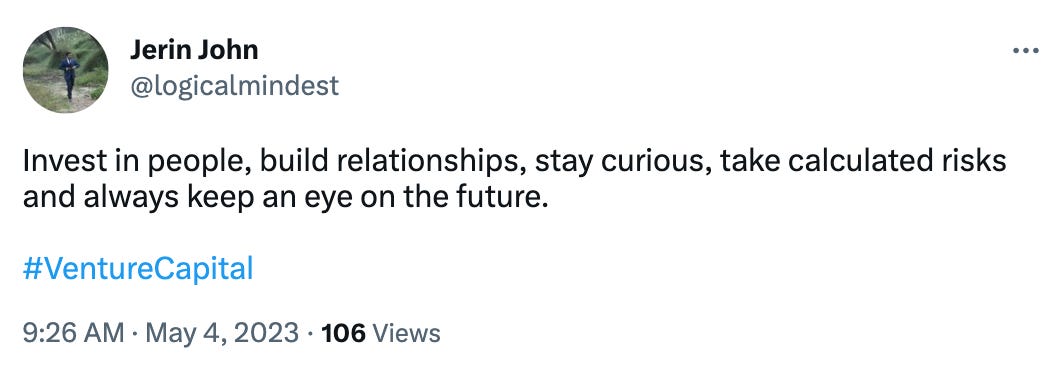Moneyball is a fortnightly newsletter from Koble exploring the limitations of human decision-making and their implications for startup investing.
We’ve spent two years developing our groundbreaking algorithms, which discover early-stage startups that outperform the market and predict their probability of success.
This week
🧠 Mental Model #14 – Action Bias – The hardest thing in investing
📖 Investor reading – How Silicon Valley’s troubles are reshaping venture capital – How this investor widens the net by refusing warm intros – London needs to up its game if it is to stay tech capital
💬 Some tweets – VC is only built for founders that want to build massive companies – The right idea at the wrong time – Invest in people, build relationships, stay curious, take calculated risks and always keep an eye on the future
The hardest thing in investing
“The hardest decision is no decision.”
– Chamath Palihapitiya
We are all biased toward action.
Human beings tend to favour doing something over doing nothing, even when there is no indication that acting will create a better result.
This tendency to choose action over inaction might be irrational. But it’s irresistible.
Why is this so? The general argument seems to be that action bias is an evolutionary mechanism, part of the human OS since the very beginning. Seen in this light, action is adaptive in terms of survival, and over a long time horizon becomes a reinforced behavioural pattern. Nurture has become nature.
Survival is a strong incentive to act – perhaps the strongest of all – and incentives can help us understand action bias more fully.
Operant Conditioning – an offshoot of behavioural psychology – involves modifying behaviours through the association of stimuli with reinforcement or punishment. And it has proved that rewards are more efficient in increasing behaviour than punishments are in decreasing behaviour.
Signalling effects are also important. Taking action signals to others that we are dynamic and productive, resulting in praise and increased social status.
And we must not forget about empowerment – action helps us to feel that we have control over a situation, which makes us feel safe and secure. Conversely, inaction makes us feel uncomfortable, perhaps even vulnerable to the actions of others.
Everton goalkeeper Jordan Pickford’s recent penalty save provides a neat case study on action bias. Pickford saved a penalty kick after correctly predicting that Leicester City's James Maddison would shoot down the middle of his goal. Instead of doing something, he did nothing, winning his team a valuable point.
Action bias is a big deal, because it has systemic effects.
In 2000, Patt and Zeckhauser published one of the earliest papers on the action bias, focused on policy-making as a domain where action tends to trump inaction.
To make a positive impression – an “impact”, so to speak – politicians often pass headline-grabbing environmental policies. These actions give everyone the impression that things are being done, the world is changing for the better, humanity is moving in the right direction etc etc… but in reality, the positive effects are minimal. In turn, our own bias towards action results in us applauding the actions of others – even if they are ineffective and hollow.
Implications for investors
In financial markets, action bias leads people to trade more frequently, resulting in high traction costs and mean reversion.
Behavioural finance professors Brad Barber and Terrance Odean found that individual investors pay a tremendous performance penalty for active trading. Their analysis of accounts at a large American discount stock broker between 1991 to 1996 found that those trading the most earned an 11.4% percent annual return, while the market returned 17.9% percent.
This is one of the reasons for the outperformance of private markets – illiquid assets and long time horizons prevent people from selling investments before they have time to generate meaningful returns. Research from Bain Capital highlights this “illiquidity premium”, showing that buyout funds in the US, Europe and Asia-Pacific generate a stronger net pooled IRR than their public market equivalents across time periods.
A wise man once observed that the stock market serves as a relocation centre – over time, money is moved from the active to the patient. The very illiquidity of venture capital – something that many people seem intent to eliminate – is the primary driver of alpha versus other more liquid markets. Risk and return cannot be separated; they’re two sides of the same coin.
This is not to argue against action per se; simply caution against our inherent bias towards it. Legendary value investor Li Lu has said that:
“The art of investment is the discipline of inaction in the absence of a good opportunity, but aggressive action when one is identified.”
Action bias is extremely hard to eliminate. Automatic behaviours cannot be unlearned, but they can be managed using operational producers, checklists, and psychological techniques. Portfolio monitoring is obviously a critical part of startup investing, but obsessive monitoring (and indeed meddling) serves nobody – not LPs, not founders, and certainly not GPs.
Doing nothing goes against the grain. The contemporary literature on life and investing is all about hustling, testing, and iterating our way towards self-actualisation. The talking heads on Bloomberg rarely speak about patience as a driver of returns. But perhaps we should do less hustling, and more watching, waiting, and biding our time?
Sometimes in life and investing it pays to do nothing.
Work with Koble
At Koble, we’ve spent two years developing our groundbreaking algorithms, which discover early-stage startups that outperform the market and predict their probability of success.
We’re working with forward-thinking angels, VCs, family offices, and hedge funds to re-engineer startup investing with AI. If that resonates, get in touch.
Investor reading
🤦♂️ How Silicon Valley’s Troubles Are Reshaping Venture Capital – After unprecedented dominance of US startup funding in the 2010s, the region has lost some ground. But it’s still number 1 by a long distance.
👂 How this investor widens the net by refusing warm intros – GoAhead Ventures will hear anyone’s pitch, no matter where in the world they are or what they are building as long as they are a pre-seed or seed company.
🇬🇧 London needs to up its game if it is to stay tech capital – For more than a decade London has been the jewel in the crown of Europe’s growing tech sector. But momentum is ebbing away from the UK capital faster than from other cities.
Some tweets
Parting shot
“All of humanity’s problems stem from man’s inability to sit quietly in a room alone.”
― Blaise Pascal
Regards from your [patient] startup investing AI,
About Koble
Koble is re-engineering startup investing with AI, applying quantitative strategies that have disrupted public markets to early-stage startup investing.







